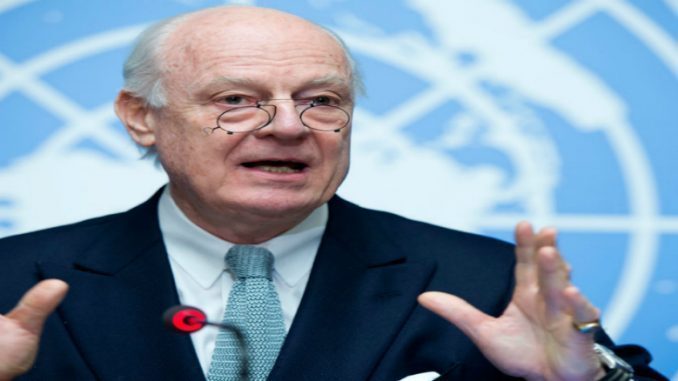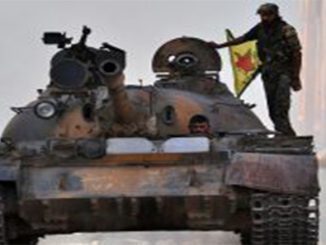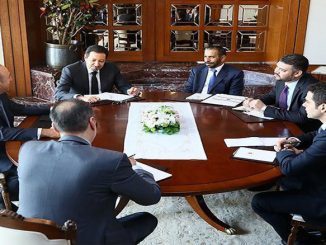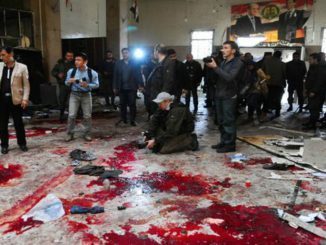
The UN Security Council passed a resolution supporting the truce in Syria and planned peace talks, despite continued clashes that made the ceasefire fragile.
Many ceasefire agreements accompanied by peace talks meetings were organized to help find a solution to the crisis, but Assad regime and Iranian forces breached every ceasefire and hindered every peace talks meeting without any pressure moves or real steps from the western powers.
The recent months especially witnessed numerous meetings between the US and Russian foreign ministers to find a solution to the Syria crisis, end the violence and start new peace talks but they led to nothing.
in the end, Russia said it has a new plan for Syria peace talks which can be achieved with powers that have a real effect on the Syrian ground.
Russian President Vladimir Putin said that that Syrian opposition groups and the Syrian government had signed a number of documents including a ceasefire deal that will be guaranteed by Turkey and Russia.
The documents include a ceasefire agreement between the Syrian government and the opposition, measures to monitor the ceasefire deal and a statement on the readiness to start peace talks to settle the Syrian crisis, Putin said.
The truce, which is the third announced this year, came into effect at midnight on Thursday and follows the evacuation of Aleppo and the city’s surrender to forces loyal to Bashar al-Assad. It covers all areas of the country except those under Islamic State control.
The UN Security Council has unanimously endorsed the ceasefire currently in effect in Syria.
The resolution, approved late on Saturday, called for the “rapid, safe and unhindered” delivery of humanitarian aid throughout the country.
Vitaly Churkin, Russia’s ambassador to the UN, praised efforts to end the year with an international agreement for Syria and thanked Turkey for its “substantive contribution”.
“It is very important that the Security Council backed these efforts by Russia and Turkey,” he said.
Endorsing the resolution “means that if all of us look together to certain objectives rather than to attempt to gain benefit, then we are able to make important decisions”.
Russia was forced to accept a number of amendments to see the resolution pass, according to Al Jazeera.
“Key among them was that the Russia-Turkey brokered ceasefire was part of a wider UN initiative aimed at restoring political dialogue,” the report said.
“Russia has made it clear that this resolution is in no way meant to supplant a UN push to start talks in Geneva.”
Staffan de Mistura, the UN special envoy for Syria, has said he intends to bring together representatives of the rival parties for talks in Geneva after February 8.
However, Clashes and airstrikes persisted in some areas since the ceasefire began on Friday and continued on Saturday.
Two different papers
Syrian state news agency SANA said the agreement excluded the Islamic State group, Jabhat Fateh al-Sham, the group formerly known as al-Nusra Front, and “groups linked to them”, without specifying who these groups are.
On the other hand, the rebels said that only ISIS was excluded.
The rebels said it appeared the government and the opposition had signed two different versions of the ceasefire deal, one of which was missing “a number of key and essential points that are non-negotiable”, but did not say what those were.
“There is a different interpretation on this ceasefire between Syrian opposition groups on the one hand and the Russians and other parties on the other,” an analyst said.
“The opposition said the ceasefire includes all Syrian factions excluding ISIS, whereas the Russians said it would exclude all UN-designated terrorist organizations including al-Nusra Front,” said Kabalan. “This [difference] is a ticking bomb that will jeopardize the whole process as the Syrian forces will go after al-Nusra and that will put the Syrian opposition factions in a very difficult position.”
Excluding Jabhat Fateh al-Sham could “create some problems” and “further undermine the ceasefire’s chances of holding,” another analyst said.
The group, he said, “has a presence in areas where moderate rebel groups are operating – around Aleppo, Idlib and on the outskirts of Damascus”.
“If the Russians and the Syrian government decide to target the positions of Nusra [Jabhat Fateh al-Sham], the potential for casualties among other groups is going to be high”.
Asad regime used this confusion and continues its attacks on the areas held by the rebels since the first day of the truce.
“Continued violations by the regime and bombardment and attempts to attack areas under the control of the revolutionary factions will make the agreement null and void,” a statement signed by a number of rebel groups said.
This statement shows that the rebels may be forced to renew the fighting.
“They [Syrian rebel groups] have sent an urgent appeal to the UN and to Turkey, who is the key player in the ceasefire, to negotiate with the Russians and try to stop the Syria government from fighting, warning that if the fighting continues there will be no option but to resume the fighting,” a journalist said.
The Syrian crisis began as a peaceful demonstration against the injustice in Syria. Assad regime used to fire power and violence against the civilians and led to armed resistance. 450.000 Syrians lost their lives in the past five years according to UN estimates, and more than 12 million have lost their homes.



